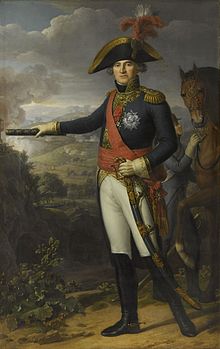Jean Mathieu Philibert Sérurier
Jean Mathieu Philibert Sérurier (born December 8, 1742 in Laon , France , † December 21, 1819 in Paris , France) was a French Revolutionary General, Marshal of the Empire and Peer of France .
Life
Joined the militia at the age of 13, Sérurier served for 34 years a. a. in Hanover, Portugal and Corsica. In the Seven Years' War he was injured in the Battle of Warburg in 1760. At the time of the revolution he was captain , served in the Italian army under General Biron in 1793 and took part in the campaigns there. On August 22, 1793 he was promoted to Général de brigade and on June 13, 1795 to Général de division .
Under Napoléon , who received the supreme command in Italy on March 27, 1796 , he was able to distinguish himself, so that Napoléon said: "We owe him the victory at Mondovi on April 22nd." Sérurier was instrumental in the siege of Mantua and concluded Wurmser's surrender on February 2, 1796. After further successful battles he occupied Graz , excelled in the battle of Arcola so that Napoléon named him in the army command and granted him the honor of bringing 22 captured flags to Paris to the Directory . Back he received the supreme command of the Venetian provinces.
On September 24, 1798, Sérurier became Inspector General of the Infantry and in 1799 drove the English and Neapolitans out of Livorno . In the further clashes, however, he was captured by the Russians under Suvorov . Back in Paris he was one of the first to support Napoléon in the coup d'état of 18th Brumaire . He was the commander of the troops in Saint-Cloud , where the Council of Five Hundred had gone and who, as a result of the events, threatened and put pressure on the Council. Napoléon thanked him by appointing Sérurier governor of the invalids on April 25, 1804 and Maréchal d'Empire on May 19 .
During the landing expedition of the English on the island of Walcheren in 1809, Serurier received the general command of the Paris National Guard , but did not have to intervene because the English withdrew as a result of the measures that Bernadotte had taken. When the Allied enemies approached Paris in 1814, he made the decision to have captured flags and similar spoils burned in 1800. In the Senate he then votes for the end of the Empire and received under Louis XVIII. the title of a pair of France . However, he lost this title after the second restoration , as he had again shown himself to Napoléon after his return. Sérurier died withdrawn on December 21, 1819 in Paris.
Honors
His name is entered on the triumphal arch in Paris in the 24th column.
literature
- Karl Bleibtreu : Marshals, Generals, soldiers of Napoleon I. VRZ-Verlag, Hamburg 1999, ISBN 3-931482-63-4 (reprint of the Berlin 1899 edition).
- Désiré Lacroix: The Marshals of Napoleon I ("Les maréchaux de Napoléon"). Verlag Heinrich Schmidt & Carl Günther, Leipzig 1898 (transferred by Oskar von Bieberstein).
| personal data | |
|---|---|
| SURNAME | Sérurier, Jean Mathieu Philibert |
| BRIEF DESCRIPTION | French revolutionary general, marshal and peer of France |
| DATE OF BIRTH | December 8, 1742 |
| PLACE OF BIRTH | Laon , France |
| DATE OF DEATH | December 21, 1819 |
| Place of death | Paris |
